At the end of your hard-working day, soaking in a hot tub is a great way for relaxation and relief of muscle pain. Epsom salts are also great for this purpose.
Amazingly, it works better if you combine the two. It is appealing for most users to put Epsom salt in their bathtubs.
But “can I put Epsom salt in my hot tub?”/ Are Epsom salts safe for hot tubs?- These are some of the common questions that many hot tub users have in mind.
Can you put Epsom salt in hot tub or not?– There are some important considerations to bear in mind.
Here, I’ll uncover these facts.
Table of Contents
Can You Put Epsom Salt In Hot Tub? -4 Important Considerations
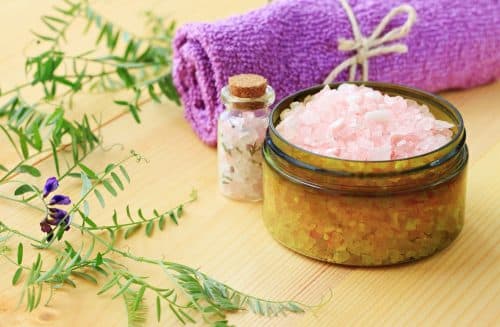
“Can I use Epsom salt in hot tub?”- Yes, you can use it as long as you use plain water in your Jacuzzi or hot tub. As there is no chlorine in plain water, there is no risk of causing negative effects if you add Epsom salt to tub water.
But the answer is “NO” if you have chlorinated water in your hot tub. It’s not a good idea to add Epsom salt to a hot tub if you’re using chlorinated water.
Here’s why.
First,
Pure Epsom salt contains magnesium sulfate. Because of its mildly acidic properties, it can drastically change the pH of the water which may lead to different issues.
On the other hand, chlorine is commonly used in most hot tub chemicals. Magnesium Sulphate reacts badly when mixed with chlorine. So, adding Epsom Salt in the chlorinated water of the hot tub is much more drastic as compared to plain water.
This will reduce the performance of the hot tub sanitizer. The unbalanced water may lead to skin irritation, flash burns, and other skin issues.
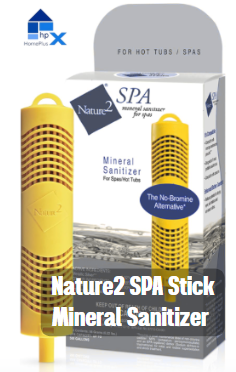
In addition, it can corrode certain parts of your hot tub costing you thousands in repair or replacement. This salt may corrode such as seals, gaskets, and other metal parts. Even it can corrode some plastic components of your hot bathtub.
Second,
For therapeutic benefit, you’ll need to add 2-3 cups of Epsom salt per bath in a regular bathtub that can hold around 80 gallons of water. On the other hand, in general, a hot tub holds approximately 400 to 500 gallons of water. To achieve the same concentration and therapeutic benefits that a regular bathtub offers, you’ll require 10 to 12 cups of Epsom salt in hot tub water. That means, adding this amount of salt translates a huge amount of solids into tub water.
Third,
If you add 10 to 12 cups of Epsom salt in hot tub water, the TDS level will certainly exceed the 1500ppm threshold. Unfortunately, it may lead to scale build-up and accumulation to the water lines, water surfaces, pumps, and jet, thus reducing the durability of the product. Ultimately the heating system of the hot tub may be damaged.
Fourth,
Generally, home spa companies recommend draining out and refill water in a hot water when its TDS (total dissolved solids) level reaches 1500 ppm or higher. If you don’t follow this, the hot tub water turns cloudy. It’s quick and easy to drain a regular bathtub. Unfortunately, it’s not that easy to drain out and refill hot tub water.
Moreover, depending on the individual hot tub manufacturer, the warranty of your purchased model may even be voided.
To sum it up: Using Epsom salt in a hot tub could cause more harm than good. So, it’s not wise to use this salt in a whirlpool, hot tub, or other tubs with jets unless the manufacturer recommends it to use. Check the owner’s manual or manufacturer’s website first.
I’ll recommend you only use Epsom salt in your regular bathtub or foot soak tub, to get soothing relaxation.
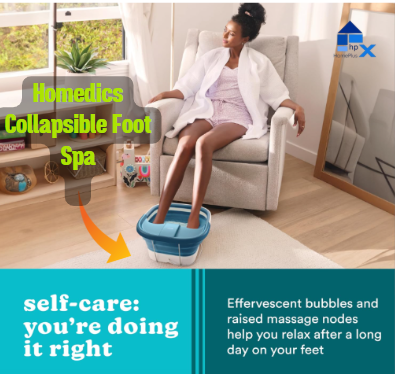
Can you put Epsom salt in hot tub?- Related FAQs
Are there any alternatives to Epsom salts for hot tubs?
Fortunately, several alternatives to Epsom salt offer the same therapeutic benefits but won’t damage your hot tub. These alternatives are:
Aromatherapy products: Although these products use Magnesium Sulfate (Epsom salt) as a primary ingredient, they are specially formulated for use in hot tubs and spas. These aromatherapy crystals don’t have any negative impact on the water chemistry and they require a small quantity to work.
PharmaSpa, Cover Valet, inSPAration, Spazazz, and Nature2 are some of the top brands that offer some of the best aromatherapy products for hot tubs. To feel your best in a lavish spa-quality environment right at your home, you can get these products.
inSPAration Spa and Bath Aromatherapy 370X Spa Liquid

Elixirs: It’s also a great alternative to Epsom salt to use in the Jacuzzi for relaxation and sore muscle treatment. This product softens the water, moisture your skin and helps you relax while you’re soaking in a hot tub.
What is Epsom salt?
It’s a chemical compound that is also known as magnesium sulfate. It consists of magnesium, sulfur, and oxygen. It is an alkaline compound featuring mildly acidic properties.
What are the health benefits of Epsom salt in tub water?
This salt has healing properties. To ease all kinds of pains and aches, Epsom salt has been used in baths for hundreds of years. A simple soak in the regular bathtub may help you feel better.
Can I use Epsom salt in a regular bathtub?
Yes, it’s common to use this salt in regular bathtubs. The standard recommendation is 2 cups of Epsom salt to a regular bathtub that holds 80 gallons of water to enjoy the full therapeutic effects.
How Can I use Epsom salt in bath?
You can take an Epsom salt bath. For a regular standard-sized bathtub, you’ll need 2 cups (approximate 475 grams) of Epsom salt or the amount recommended by your doctor. Add this quality to the bathtub water and soak your body for a minimum of 15 minutes.
I recommend consulting with your health specialist or doctor about how often and how long you should take Epsom salts bath.
Can you put Epsom salt in a Jacuzzi bath?
No, as previously explained in this post, it is not okay to add Epsom salt in a hot tub or a Jacuzzi hot tub.
Can You Use Bath Salts in a Jacuzzi Tub?
Yes, you can use plain bath salts in a Jacuzzi but the salt should not contain any added oils. Because a bath salt with added oils may create an oily residue that can cause bacterial growth. It’ll also clog the inner plumbing and intake valves. There is also a risk of damaging the pump.
Will Epsom Salt Damage an Acrylic Tub?
If you left the salt on the tub surface for extended periods, it may damage your acrylic tub. To prevent the damage make sure there is no residue left on the tub’s surface. For this, clean your acrylic tub with water and soap.
Is Epsom salt bad for bathtub plumbing?
Prolonged plumbing exposure to high concentrations of Epsom salt can cause damage. However, when used correctly, Epsom salt will not harm your plumbing. This tells you that you do not have to worry about your occasional salt-bath additives going down the drain.
How can I get silky soft and cleaner smelling water in hot water?
You can add Silk Balance Natural Hot Tub Solution to your hot tub water (click to see it on Amazon). It softens water and removes the bad odors from it, providing a more spa-like experience.
Silk Balance Natural Hot Tub Solution 76 oz:
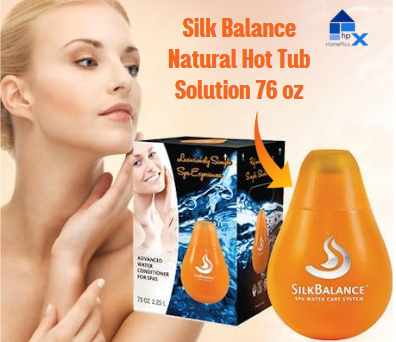
Additionally, some products are also available that will offer you a spa-like aromatherapy experience in a hot tub.
InSPAration 152 Hot Tub Spa & Bath Aromatherapy is such a product that won’t change the pH level of water. It doesn’t contain any oil that may gunk up the water and filter.
InSPAration 152 Hot Tub Spa & Bath Aromatherapy:
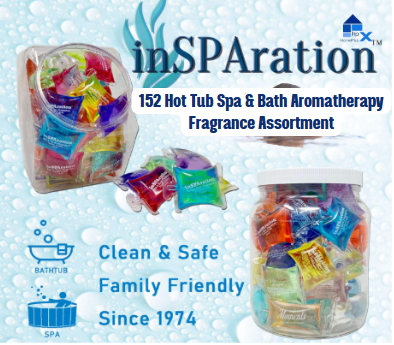
Can you put Epsom salt in an inflatable hot tub?
No. Epsom salt is also not recommended to use in inflatable hot tubs water. Although inflatable hot tubs don’t include the complex PVC pipe system that traditional hot tubs have, they come with a heater and some plumbing.
Can I add essential oil in a hot tub?
Never use essential oils in hot tubs. The reason behind this is – hot tub is not designed to filter and circulate thick substances like essential oils. As a result, using these compounds may cause build-up and damage your hot tub over time.
Fortunately, some essential oil-type products are now available that work well in hot tubs.
To further enhance your hot tub experience and maintain optimal water conditions, consider using a thermal blanket. Discover the top options in our guide to the 5 Best Hot Tub Thermal Blankets – Save Energy & Money.

Certified Pool & Spa Maintenance Specialist (CMS)
Patrick Martinez is a pool and hot tub professional. He is a Certified Pool & Spa Maintenance Specialist (CMS). He has a strong understanding of patio, spa, pool safety, maintenance, and water chemistry. (See Full Bio)